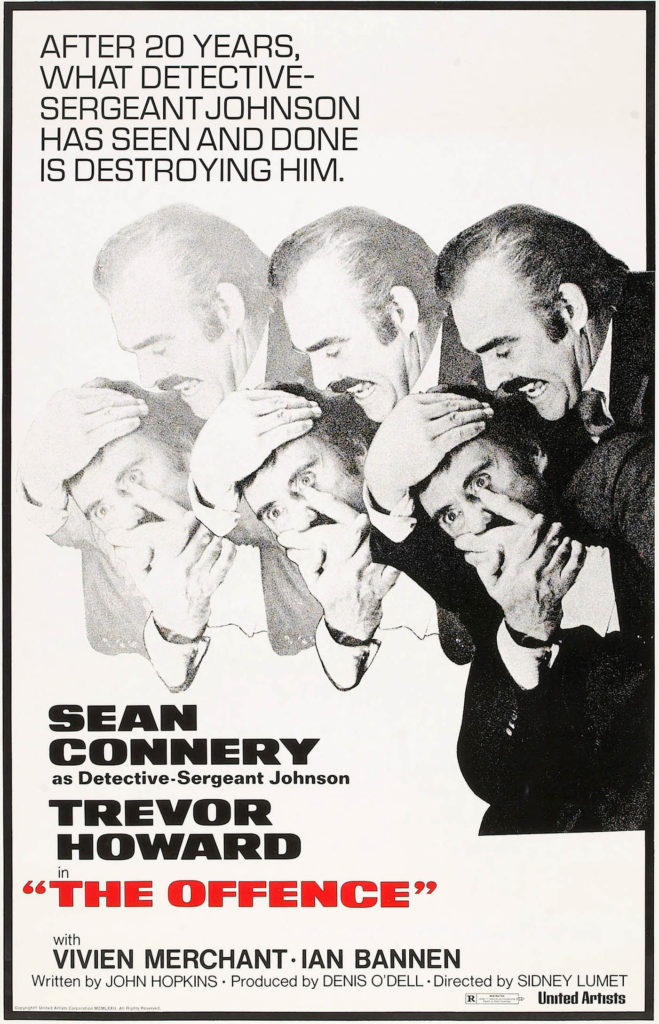 In the early 1970s, United Artists wanted Sean Connery back in the role of James Bond. Part of the deal that brought Connery back was UA agreeing to finance a pair of vanity projects for Connery, as long as the films didn’t cost much money. The Offence was the first of the pair, and the only one made.
In the early 1970s, United Artists wanted Sean Connery back in the role of James Bond. Part of the deal that brought Connery back was UA agreeing to finance a pair of vanity projects for Connery, as long as the films didn’t cost much money. The Offence was the first of the pair, and the only one made.
From 1972, The Offence is an adaptation of the play This Story of Yours by John Hopkins. Hopkins was also brought aboard to pen the screenplay, with legendary director Sidney Lumet behind the camera.
In The Offence, Connery plays Detective Sergeant Johnson, a brutal, monster of a cop in England. Lately, the Sergeant and a team of detectives have been investigating the kidnappings and rapes of schoolchildren. The situation has gotten bad enough that Johnson and the others maintain a visual presence at a local school when it lets out, but that isn’t enough to prevent another young girl from being snatched. Later, as the police search nearby woods, it is Johnson who finds the young girl, terrified and laying in the mud, and who has to comfort her. This latest offense is just another in a litany of atrocities Johnson has witnessed in his 20 years as a police officer. His mind has been on the brink for some time, it appears, and after constables nab a suspect, Kenneth Baxter (Ian Bannen), Johnson snaps. During interrogation, Johnson beats the suspect to death, and has to account for his actions.
A stage play was the perfect choice for Connery’s project. The budget restrictions UA placed on the project made it ideal for a script that has only a handful of locations. Most of the film takes place within two locations — the police station where the fateful interrogation takes place, and Johnson’s apartment, where he retreats to heap some abuse on his wife (Vivien Merchant).
This film is not so much about the death of Baxter as it is an exploration of the tormented mind of Johnson. At first, he seems little more than a garden-variety tough guy cop. He’s aggressive and mean, and uses his stature to intimidate suspects. Connery is great when the role requires such aggression. He always has been good at playing the tough guy. This film explores what’s behind the façade, however.
We begin to see the damage inflicted upon Johnson after his encounter with Baxter. Johnson goes home, aware of what he has done and the kind of retribution he faces from the law. There, we see that his demeanor as a police officer is no act. He treats his wife in appalling fashion, making her at once domestic servant and psychological punching bag. He bares his soul to her and afterwards throws more devastating insults her way, as if he needs to make up for his moment of weakness. Any sympathy that could have been engendered for this character evaporates with every harsh word to his wife. It’s hard to express how difficult this scene is to watch. This isn’t some caricature or light telling of domestic strife. Johnson is a beast that swoops into his home at random times to terrorize its other occupant.
Back at the station, it is Johnson’s turn in the interrogation chamber, and it’s in this scene that the limitations of Connery as a performer become apparent.
Detective Superintendent Cartwright (Trevor Howard) has been tasked by the department with finding out what happened in the room between Johnson and Baxter. It’s a long interrogation, and by the end Cartwright has worn Johnson down. He cries and wails about the things he has seen, at one point even pantomiming some of the horror. And not a whit of it was believable. Connery just didn’t have the range that the screenplay demanded. That’s too bad, because this is a film always on the verge of being very good. If Connery had nailed the more emotional aspects of his character, it would have elevated the film. As it is, the unevenness of the performance did most of the work that has relegated this film to obscurity.
Perhaps because this was a vanity project there was only so much that could be expected from it. But it had a big star and a giant of a filmmaker behind the camera. It’s not too much for viewers to expect more.
